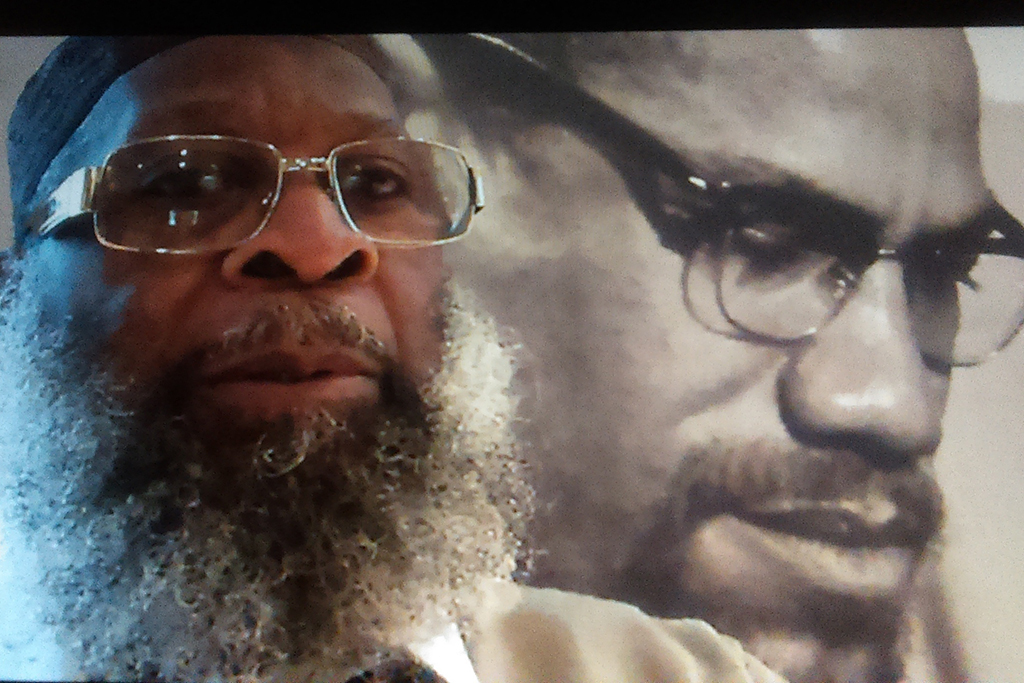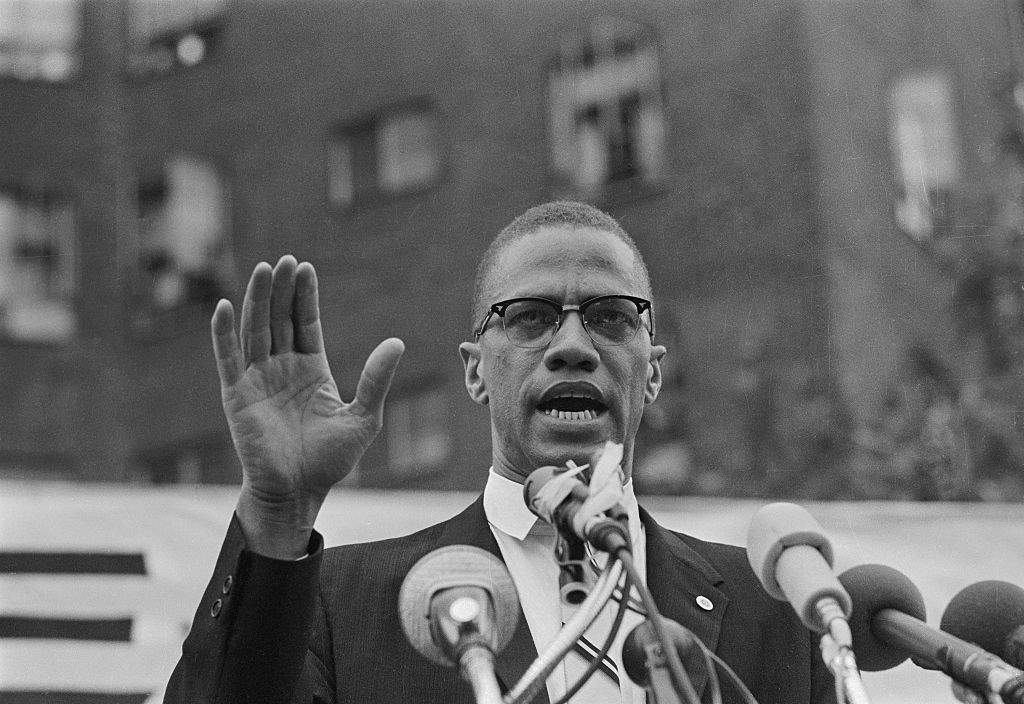Malcolm X Excerpt: Sekou Odinga On El Hajj Malik El Shabazz
In Remembrance Of Malcolm X: Read An Exclusive Excerpt From Sekou Odinga’s Forthcoming Autobiography

Source: Estate of Sekou Odinga
Sekou Odinga, who co-founded both the Harlem-Bronx Chapter and the Algeria-based International Section of the Black Panther Party, was in the process of writing his biography with his goddaughter, asha bandele, when he passed away on January 12, 2024. The excerpt below about Malcolm X is taken from the manuscript, “Freedom Fighter,” which will be published in the fall of 2025 by The New Press.
There was this one day early on in my forays into Harlem when I saw a crowd gathered in the usual place, on the corner of 125th and Seventh Avenue, near the Theresa Hotel. Seeing a crowd there was not unusual. There was no shortage of brilliant speakers in the community who could break down the political situation in the US and across the world. But on this day the crowd was different and it didn’t take long for me to realize why when I heard the voice of the person speaking. It was Malcolm.
I recognized his voice right away. Malcolm had been all over the news–and no one sounded like him… I was captivated. I still am. It’s strange. I don’t even remember what he said. I only remember how he made me feel.
It was as though finally the world I knew made sense. Like someone finally was saying what was the problem and who was causing it. Malcolm was the first person I heard who never blamed Black people. He could be critical of us when it came to what we accepted or what we were unwilling to respond to. He surely wanted us to stop capitulating to white supremacist culture and economics. But when it came to the bottom line, Malcolm was absolutely clear: those in control of the institutions and culture that defined the American society, those in control of the government–were the problems. And, he argued, they could not be fixed. Malcolm argued that the system was working exactly the way it was supposed to work.
In 1964, Harlem was our cultural Mecca. It had all the politics we needed, the events, the businesses. All you had to do was be present. In spaces that held 20, maybe 30 people, you could hear Amiri Baraka, the Last Poets, Gil Scott Heron…And as stunning as it may seem today, it actually was not uncommon for John Coltrane to come in and play, despite how famous he already was. On this one night, he brought a young sax player out to introduce to folks. His name was Pharaoh Saunders. And he and Coltrane started blowing together and then it happened. Saunders started hitting notes and blowing so powerfully, so beautifully, that Coltrane actually took his horn out of his mouth and bowed to the young brother, sat down and let him finish the set. It was incredible to witness, something like a father stepping back to allow his son to carry on a legacy. And no matter how many performances I’d seen before or after, that one on a random night in Harlem, was the greatest live moment in jazz I’d ever seen.
Alongside the cultural events, there were political ones. People were talking in teahouses, in underground clubs and on street corners about the struggles for liberation across Africa and other parts of the world. But more than anything, we were talking about Black Nationalism and we were talking about Malcolm, who said we were one people, one culture, one nation.
He taught us that if nations were defined as being a people who shared a common territory, language, history and ethnicity–then that was us, Black people here. Our original ethnic demarcations were stolen from us, forcibly extricated by those who had kidnapped and enslaved us. Language, religion, food, education–these were all imposed upon us. Even still, we were our own people, with our own ways. Our own culture. And all that land across the South we’d worked and nurtured for white people to enjoy the wealth of what we’d produced.
We made the music that would soothe our hard time on that land. Amiri Baraka would call us Blues People. No longer African and never American, we were our own people. And we were worth fighting for. We were worth defending. And it was Malcolm who made that clearest to us. He was the one who drew the logic that made the most sense to us. He said that we had to be able to fight for ourselves, not fight only when we were told to by white men and for white men’s benefit. Malcolm reminded us that all the wars America sent us overseas to fight did nothing for our freedom, our very safety, on the very land we lived and worked on.
We’d fought in Korea, against Germany and Italy and Japan. There was a war raging at that moment in Vietnam. But when, “…it [came to seeing our] own churches being bombed and little black girls [being] murdered,” Malcolm admonished us, we were suddenly afraid to fight back. Nonviolence was a requirement imposed on no group of people, no nation of people, who were under attack as we were.
Malcolm said that he didn’t want religion or anything else to keep Black people who loved Black people from working together. He said that his political philosophy and cultural emphasis was Black nationalism, which meant self-determination. It meant that we had to, “control the politics and the politicians of our community…no longer [taking] orders from outside forces.”
He told us to organize..and to be at the ready to defend ourselves. Malcolm admonished a nation of us, we who had been targets in an ongoing war, that to be nonviolent as we were under attack was in fact, criminal. In Birmingham, the dogs and hoses were turned on even on the smallest of children. How could we stand by?
I was 20-years-old in 1964 and I was changing…Me: a young man still in search of myself, still defining myself and my place in the world. But Malcolm’s message…helped me take that shape inside of myself. I knew from that time I wanted to become a soldier for our people’s justice. A warrior for our people’s freedom. Nine months later, in January of 1965…I officially joined the OAAU.
….It’s hard to remember exactly what Malcolm said at those meetings. You often don’t know you’re witnessing or a part of an historic moment right when you’re in the thick of it. But one thing that I do remember was that Malcolm’s approach was both revolutionary and evolutionary and he saw our freedom in the U.S. as linked to the freedom of Brothers and Sisters on the Continent.
And then a month after I joined the OAAU, I woke up late on a Sunday afternoon. Sundays were the days the community would crowd into the Audubon Ballroom in Harlem to hear Malcolm speak to us, his membership. But on this Sunday…I woke up late…because my crew had hosted a Saturday night party and it was daybreak by the time I got home. I was still living in my parents’ house at the time and downstairs, one of my parents or siblings had the TV on when there was suddenly a break in the program for a special report. That’s what they told me later, after they’d woken me, called me downstairs immediately… I don’t remember who. My mother? My sister? But I was told that I needed to hear what was being said. And I did. I heard it.
Malcolm X had been assassinated. He’d been shot. He was dead. Malcolm X was dead.
I fell back onto the couch. The words from the broadcaster weren’t words. Each one was a brutal strike, each one an entire body blow. It’s not as though…I didn’t know it was possible. Malcolm told us there’d been a reign of terror launched against him. He told us that membership in the NOI had dropped from a high of 100,000 people in 1960 to just 10,000 by 1965. He told us that in July of 64 four men tried to rush his car and get him. And he told us that five months later, in December of 6’4, 20 men, all Black Muslims…rushed him… as he attended a Harlem Youth Opportunities meeting.
Harlem Youth Opportunities, founded by the famous psychologists, Drs. Kenneth and Mamie Phipps Clark, had just gotten $110,000,000 from the government to reform education in Black communities and Malcolm was talking with them when they were rushed. He had to be locked, for his safety, in an office, until the police came and cleared out the intruders. The police came again on February 14th, 1965, that time to the home in Queens where Malcolm lived with his family: a Molotov cocktail had been hurled through the window.
But on February 21st, 1965, the police were nowhere to be found. At every other OAAU meeting, they were posted up all around the Audubon Ballroom where Malcolm held his mass meetings. But on February 21st, there was only one, an undercover agent, Gene Roberts, who seemed to be just as shocked when two men opened up and fired 21 shots, 10 of them buckshots, into Minister Malcolm, our Prince, our Shining Black Prince.
Twenty-one shots. Ten of them buck.
All fired into all that hope, all that possibility, all that vision, all that demand for our freedom. Our Black freedom. Our God-given birthright…
To be respected as…human being(s)…
In this society
On this Earth
In this day
Which we intend to bring into existence
By any means necessary.
SEE ALSO:
Malcolm X In His Own Words: Rare Video Of El Hajj Malik El Shabazz That Is Still Relevant Today
















